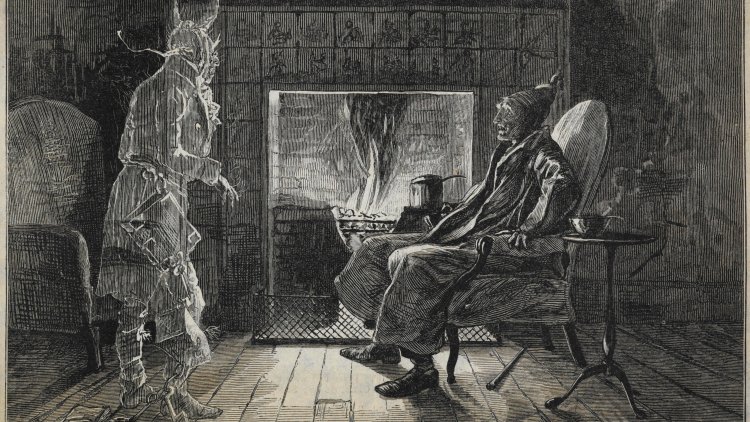The Most Haunting—And Most Inspiring—Moment in <em>A Christmas Carol</em>
This year, forgo despair and listen to Jacob Marley.

This is an edition of The Atlantic Daily, a newsletter that guides you through the biggest stories of the day, helps you discover new ideas, and recommends the best in culture. Sign up for it here.
Around the world, authoritarians seem to be regaining their strength and daring. In the United States, a political coalition—one that includes people for whom, as my colleague Adam Serwer has memorably written, “the cruelty is the point”—is returning to power. It’s been a tough year for people who believe in liberal democracy. But during the Christmas season, let me make the case for a little faith in the resilience of goodness and justice—and how we can all learn something from Charles Dickens and one of his best-known works, A Christmas Carol.
You don’t need to be a Christian to find solace in A Christmas Carol, because it’s not really a story about Christianity. It’s a story about one man’s bitterness, his regrets, and his repentance. More broadly, it’s about the joy that everyone can find by deciding to be a better person in a world that sometimes feels cold and overwhelming.
The main character of the story is the legendary Dickens character Ebenezer Scrooge, an obnoxious miser who delights in his sneering misanthropy. (Many wonderful actors have played Scrooge in various adaptations, but I especially revere George C. Scott in the 1984 television movie.) Scrooge is a mossy cistern of cold, sour inhumanity. His miserliness isn’t just about hoarding wealth for himself; it’s about the petty vengefulness he takes in denying money to others. When two men come to his office to ask for contributions to alleviate the suffering of the indigent, one of them tells Scrooge that poor people would rather die than go to the workhouses and other nightmarish institutions to which they are consigned. Scrooge responds with calm and undiluted contempt: “If they would rather die,” he says, “they had better do it, and decrease the surplus population.”
I don’t want to overdraw comparisons to our current politics, but when political leaders are talking about creating mass detention camps in America, and voters—even those who were once undocumented immigrants themselves—approve of such ideas despite the danger to their own family, this kind of Victorian viciousness feels uncomfortably relevant.
Back to Scrooge: What about the people who don’t want his money, the happy souls who are merely living their life and indulging in the joy of the season? Well, he hates them too. When Scrooge’s nephew, Fred, a good and gentle young man, asks his uncle why he deplores Christmas so much, Scrooge sneers:
“If I could work my will,” said Scrooge indignantly, “every idiot who goes about with ‘Merry Christmas’ on his lips, should be boiled with his own pudding, and buried with a stake of holly through his heart. He should!”
Scrooge, of course, will soon see the error of his ways. He will realize that despite attaining wealth and privilege, he is angry and unhappy because of a self-loathing that is mostly the result of his own choices. He will eventually beg forgiveness: Every year, I feel tears in my eyes when Scott, as Scrooge in the 1984 film, wipes the snow from an unloved stone in a barren graveyard, sees his own name, and pleads with the spectral Ghost of Christmas Yet to Come for a chance to change.
The real hero of A Christmas Carol, however, is not Scrooge but his long-deceased business partner, Jacob Marley, whose presence in the story is brief but crucial. (He is, after all, mentioned in the famous first line: “Marley was dead: to begin with.”) Marley, in life a pinchpenny recluse like Scrooge, died seven years before the tale begins. When he comes to Scrooge as a frightening apparition on Christmas Eve, he is wrapped in a winding chain attached to now-useless ledgers and cash boxes. He laments to Scrooge that he is forever doomed to wander the Earth among the human beings he so assiduously ignored while making his money.
Scrooge at first resists believing his own eyes, but he finally accepts that he’s talking with a damned soul. For Marley, it is too late, but he hopes to save Scrooge:
“I am here to-night to warn you, that you have yet a chance and hope of escaping my fate. A chance and hope of my procuring, Ebenezer.”
“You were always a good friend to me,” said Scrooge.
Scrooge, however, doesn’t get it. He is confused by Marley’s damnation, because for him, material success is evidence of a virtuous life. (This is hardly a Victorian conceit: Think of how many people believe this right now.) When Scrooge tries to comfort the ghost, Marley will have none of it:
“But you were always a good man of business, Jacob,” faltered Scrooge, who now began to apply this to himself.
“Business!” cried the Ghost, wringing its hands again. “Mankind was my business. The common welfare was my business; charity, mercy, forbearance, and benevolence, were, all, my business. The dealings of my trade were but a drop of water in the comprehensive ocean of my business!”
These last three lines chill me, yet encourage me.
Scrooge’s repentance comes after years of a wasted life and a night of trauma and shame. The rest of us, however, don’t have to wait. Each of us, every day and in our own small way, can resolve right now that mankind is our business, that the common welfare is our business, and that charity, mercy, forbearance, and benevolence are all our business, no matter what we do to fill our days or put food on our table—and no matter whom we voted for.
Americans can’t control much of what’s about to happen in their national politics. Some of the people about to govern the United States may be determined to be conscientious public servants, but others seem convinced that their fellow citizens are, to use the president-elect’s words, “vermin” and “scum.” These people will bring division to our public life. Responding in kind, or acquiescing, or withdrawing entirely and believing in nothing, will all be powerful temptations. Giving in to anger or despair is easier, of course, but such feelings are empty emotional calories that eventually leave people spiritually starved. We might hope that others will change their mind, but the sustainable path is to control what’s in our own heart.
The graveyard scene in the 1984 production of A Christmas Carol was filmed in the town of Shrewsbury, England. The stone marker that Scott’s Scrooge discovers in the snow was left in place, and for 40 years, it’s been a tourist attraction.
Last month, someone vandalized it, smashing it into pieces.
For all I know, the culprits could have been local kids experiencing their first tangle with beer (and the stone has since been repaired), but I found the news dispiriting: It seemed like a perfect comment on our modern age of cynicism and avarice that someone trashed the place where Scrooge found his redemption. Learning of this vandalism was part of why I decided to write about A Christmas Carol today. As heartening as it is to think of Scrooge’s happy repentance, it reminded me that we are better served by heeding Marley’s words—so that we never find ourselves in the snow, staring at our own grave, and wondering whether we still have time to set things right.
Related:
Here are three new stories from The Atlantic.
Today’s News
- Hay’at Tahrir al-Sham, the rebel group that toppled Bashar al-Assad’s regime, announced in a Telegram post that its leader has reached a deal with other rebel leaders in its coalition to dissolve all factions and merge them under the defense ministry.
- American Airlines resumed service this morning after a brief outage that grounded all planes.
- Residents along California’s coast are under high-surf and flooding threats, a day after a major storm.
More From The Atlantic
- You are drinking the wrong eggnog
- Elizabeth Bruenig on Joe Biden’s moral wisdom
- Two different ways of understanding fatherhood
- The Space Telescope Advent Calendar
Evening Read
How to Not Fight With Your Family About Politics
By Elizabeth Harris
My family includes a farmer and a fiber artist in rural Kentucky, who rarely miss a Sunday service at their local Baptist church; a retired Jewish banker on the Upper West Side of Manhattan; a theater director in Florida; a contractor in Louisville; a lawyer in Boston; and a gay Republican.
Talking about politics at our family gatherings can be like smoking a cigarette at a gas station—there’s a good chance it will make the whole place explode. What’s always impressed me about our big, mixed-up family is not just that we survive Christmas dinner, but also that the family includes several couples who disagree politically with the people they live with every day: their own spouses. They haven’t voted for the same candidate, much less for the same party, in years.
Culture Break
Watch. The protagonists of Babygirl (in theaters) and Black Doves (streaming on Netflix) are stuck in their “perfect” lives—and find illicit fulfillment outside them, Sophie Gilbert writes.
Listen. Check out our list of the 20 best podcasts of 2024.
Isabel Fattal contributed to this newsletter.
When you buy a book using a link in this newsletter, we receive a commission. Thank you for supporting The Atlantic.
What's Your Reaction?




















